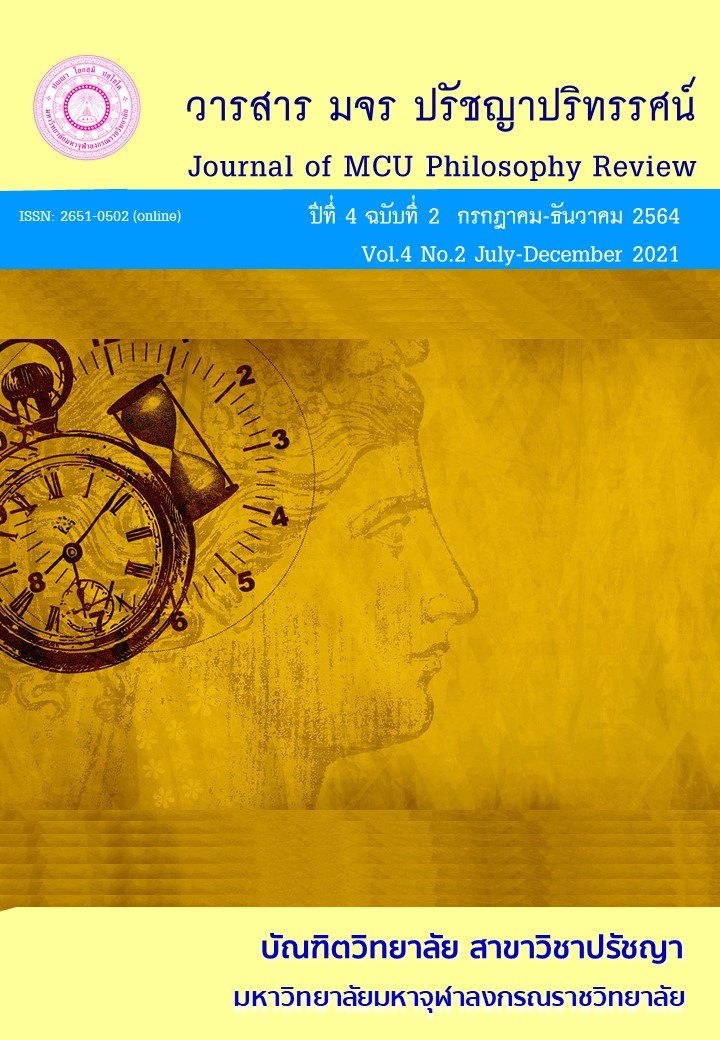A social media business’ social responsibility to hate speech in Buddhist ethical viewpoint
Main Article Content
Abstract
This paper is purposely attempted to examine the ethical problem that: ‘ought the business owners of social media platform to take social responsibility over the prevailing of hate speech in the online world?’ In this matter, on the one hand, some argued that the onus is on the owners of such platform because the business belongs to them then they have the power to properly manage the platform of social media, on the other hand, some argued against it that such an act is contradict to free speech, therefore, there should not be any management on any statement in the social online media. Moreover, they proposed that while reading or judging information involved, the readers themselves should exercise their thoughtfulness. In this paper, it will consider the mentioned ethical problem in light of Buddhist ethics while analyzing the debate.
In analyzing, it was clearly found that according to Buddhist ethics the hate speech one ought not to perform because it brings about the evil to a society and it is not accorded with the principle of free speech. Besides, a good society should be in accordance with the cooperative will where people perform the duty to benefit the collective happiness of a society. Therefore, when the hate speech is introduced to the social online media, the mentioned business owner should take a social responsibility through controlling it in the way it will not bring about the violence to a society. To prohibit violation of free speech, the consumer should be allowed to consider such hate speech. Based on this way, it would shed the light on the guideline to fight against hast speech where the realization of rights, freedom and respect for human dignity would yield the well-being to a society.
Article Details

This work is licensed under a Creative Commons Attribution-NonCommercial-NoDerivatives 4.0 International License.
บทความที่ได้รับการตีพิมพ์เป็นลิขสิทธิ์ของวารสาร มจร ปรัชญาปริทรรศน์
ข้อความในบทความที่ได้รับการตีพิมพ์ในวารสาร ถือเป็นความรับผิดชอบของผู้เขียนบทความ และข้อคิดเห็นนั้นไม่ถือว่าเป็นทัศนะและความรับผิดชอบของกองบรรณาธิการวารสาร มจร ปรัชญาปริทรรศน์
References
มหาจุฬาลงกรณราชวิทยาลัย. (2539). พระไตรปิฎกภาษาไทย ฉบับมหาจุฬาลงกรณราชวิทยาลัย. กรุงเทพมหานคร: โรงพิมพ์มหาจุฬาลงกรณราชวิทยาลัย.
เค. เอ็น. ชยติลเลเก. (2537). จริยศาสตร์แนวพุทธ. (ผศ.สุเชาวน์ พลอยชุม, แปล). พิมพ์ครั้งที่ 3. กรุงเทพมหานคร: โรงพิมพ์มหามกุฏราชวิทยาลัย.
ชาญชัย ชัยสุขโกศล. (2554). Hate Speech และข้อมูลที่อันตราย: ทางเลือกวิธีตอบโต้ทางการเมือง. (รายงานวิจัย). สำนักงานกองทุนสนับสนุนการวิจัย.
พระพรหมคุณาภรณ์ (ป. อ. ปยุตฺโต). (2558). พุทธรรม ฉบับปรับขยาย. พิมพ์ครั้งที่ 41. กรุงเทพ: สำนักพิมพ์ผลิธัมม์.
พระพรหมคุณาภรณ์ (ป. อ. ปยุตฺโต). (2558). (2559). พจนานุกรมพุทธศาสตร์ ฉบับประมวลธรรม. พิมพ์ครั้งที่ 34. [PDF Version]. สืบค้นจาก https://www.watnyanaves.net/uploads/File/books/pdf/dictionary_of_buddhism_pra-muan-dhaama.pdf.
พระสิริมังคลาจารย์. (2552). มงฺคลตฺถทีปนี (ปโม ภาโค). พิมพ์ครั้งที่ 16. กรุงเทพมหานคร: โรงพิมพ์มหามกุฏราชวิทยาลัย.
พิรงรอง รามสูต. (2558). ประทุษวาจากับโลกออนไลน์. กรุงเทพ: มูลนิธิเพื่อการศึกษาประชาธิปไตยและการพัฒนา (โครงการจัดพิมพ์คบไฟ).
พุทธทาสศึกษา. (ม.ป.ป.). ธัมมิกสังคมนิยมของพุทธทาสภิกขุ. [PDF Version]. สืบค้นจาก http://www.buddhadasa.org/files/pdf/B_pdf/all/all12.pdf.
ปรีดา ทองชุมนุม. (2558). คู่มือการทำความเข้าใจ เรื่อง สิทธิพลเมืองและสิทธิทางการเมือง. กรุงเทพมหานคร: สำนักงานคณะกรรมการสิทธิมนุษยชนแห่งชาติ.
วัชระ งามจิตรเจริญ. (2563). สมการความว่าง. พิมพ์ครั้งที่ 3. กรุงเทพ: สยามปริทัศน์.
สมภาร พรมทา. (2548). พุทธปรัชญา : มนุษย์ สังคม และปัญหาจริยธรรม. กรุงเทพ: สำนักพิมพ์ศยาม.
องค์กร ARTICLE 19. (2019). คู่มือไขข้อสงสัยเรื่อง ‘ถ้อยคำสร้างความเกลียดชัง’. [PDF Version]. สืบค้นจาก https://www.article19.org/wp-content/uploads/2019/12/Hate-Speech-Explained-A-Toolkit-Thai-Version-min.pdf.
อัศวิน อุดทาคำ. (2558). ขอบเขตเสรีภาพในการแสดงออก: ศึกษากรณีคำพูดหรือการกระทำที่สร้างความเกลียดชังตามแนวคำวินิจฉัยศาลสิทธิมนุษยชนยุโรปและศาลสหรัฐอเมริกา. วิทยานิพนธ์นิติศาสตรมหาบัณฑิต สาขากฎหมายมหาชน. มหาวิทยาลัยธรรมศาสตร์.
Equality and Human Rights Commission. (2015). Freedom of expression. [PDF Version]. สืบค้นจาก https://www.equalityhumanrights.com/sites/default/files/20150318_foe_legal_framework_guidance_revised_final.pdf.
Jeffrey W. Howard. (2019). Free Speech and Hate Speech. Annual Review of Political Science. Vol. 22: 93-109.


